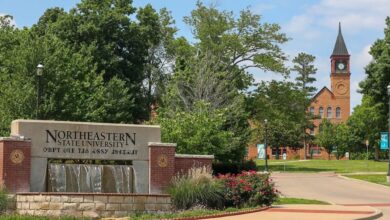Commonwealth Cyber Initiative Funds 11 Cybersecurity Projects

Researchers from Virginia Tech, University of Virginia, William & Mary, George Mason University, and Old Dominion University are addressing accessibility issues in cybersecurity.
Virginia researchers are working to ensure people feels safer and that their privacy is more protected on computer networks and other devices through a new cybersecurity program funded by the Commonwealth Cyber Initiative (CCI).
CCI awarded 11 projects as part of its 2024 Addressing Accessibility in Cybersecurity Program.
Researchers are from Virginia Tech, George Mason University, the University of Virginia, William & Mary, and Old Dominion University.
The CCI hub in Arlington funded six projects with additional funding for projects coming from CCI’s Coastal Virginia Node for one project, Northern Virginia Node for two projects, and Southwest Virginia Node for two projects.
The strength of the proposals prompted CCI node directors to fund additional projects.
CCI Northern Virginia Node Director Liza Wilson Durant said, “As CCI breaks new ground with new cybersecurity solutions and technologies, we want to invest in solutions that meet a diversity of user needs. This requires intentional investment and research that leverages a diversity of disciplines, not only computing and engineering but also the social sciences for example. “We are excited by the potential impact these transdisciplinary teams will have on cybersecurity challenges across diverse populations,” she said.
“Cybersecurity helps protect our data and the infrastructure we use every day,” said Luiz DaSilva, CCI executive director. “Our first inclusive cybersecurity program is addressing some of the challenges in making sure that security reaches as many people as possible. CCI researchers will be addressing authentication, social bias, vulnerability measures for older adults, and more. We are excited about the new opportunities and impact this research could have on our communities.”
CCI Southwest Virginia Node Director Gretchen Matthews said, “The CCI Southwest Virginia Node wanted to invest in this type of research to ensure that cybersecurity efforts reach some of the most vulnerable communities. Our hope is that this program will continue and have long lasting impacts.”
About the Funded Projects:
- Marcos Zampieri of the George Mason University School of Computing Department of Information Sciences and Technology will study content moderation to better understand human and machine perception of what others might find offensive by exploring how one group thinks another group will perceive potentially offensive content. The goal is to develop more inclusive, transparent, and trustworthy content moderation processes.
- Vikas Ashok of the Old Dominion University (ODU) Department of Computer Science and Faryaneh Poursardar of ODU’s Virginia Modeling and Simulation Center, will plug a gap in dark-pattern research by developing counter-measures to mitigate deceptive patterns on websites that are specific to blind and low vision users who use assistive technologies.
- Lannan Lisa Luo and Qiang Zeng of George Mason University’s Computer Science Department will address accessibility gaps in authentication technologies, ensuring that individuals with disabilities can seamlessly and securely interact with everyday objects in their environments, facilitating their independence and fostering a sense of inclusiveness in their interactions with the world.
- Emanuela Marasco of George Mason University’s Center for Secure Systems will develop a contactless biometric mobile security application to correct the vulnerabilities of deep artificial intelligence (AI) and optical sensors and allow marginalized people equal access to data security regardless of gender and skin tone.
- Hemant Purohit of the George Mason University School of Computing, Fengxiu Zhang of Mason’s Schar School of Policy and Government, Jin Hee Cho and Chang-Tien Lu of Virginia Tech’s Department of Computer Science Department, and Michin Hong of Indiana University’s School of Social Work will develop a method to use the Social Cyber Vulnerability Index to detect fraud in online social spaces while factoring in demographic behavioral vulnerabilities that introduce representation bias due to disparities in detection-model training.
- Abhijit Sarkar of the Virginia Tech Transportation Institute and Lynn Abbott of Virginia Tech’s Bradley Department of Electrical and Computer Engineering aim to build an inclusive cyber system using biometric authentication derived from the cardiovascular system, which will ensure that security systems are accessible and fair to everyone, irrespective of skin tone, gender, age, or physical ability. Cardiac biometrics depend on internal characteristics rather than external appearance.
- Bimal Viswanath of Virginia Tech’s Department of Computer Science, Yixin Sun of the University of Virginia’s (UVA) Department of Computer Science, and Lanfei Shi of UVA’s McIntire School of Commerce will create tools to counteract threats from AI-driven malicious entities on social media platforms. Raising awareness of these threats will facilitate the development of effective strategies to safeguard marginalized and vulnerable communities from exploitation.
- Ziwei Zhu of George Mason University’s Department of Computer Science and Jin R. Lee of Mason’s Department of Criminology, Law and Society aim to significantly improve the inclusion and accessibility of Large Language Model applications in cybersecurity by addressing algorithmic bias, focusing on reducing unfair treatment against vulnerable populations identified by gender, race, religion, sexual orientation, and disability.
- Mary L. Still of Old Dominion University’s Department of Psychology and Jeremiah D. Still of ODU’s School of Cybersecurity will revise complex cyber hygiene materials to present information in plain language to promote equitable digital access. They’ll develop inclusive design guidelines for those with comprehension challenges associated with digital literacy and reading comprehension, benefiting vulnerable groups as well as the general population.
- Yanfu Zhang and Qun Li of William & Mary’s Department of Computer Science will develop password technology for those with mobility impairments, harnessing Brain-Computer Interface systems to create a machine learning system using portable electroencephalogram headsets to extract passwords from users’ brain signals.
- Tabitha L. James and Viswanath Venkatesh of Virginia Tech’s Pamplin College of Business will study the impact of judgmental or “judgy AI” on vulnerable populations such as minorities and the underprivileged. Understanding of the effects of judgy AI systems can have design, regulatory, and legal ramifications for the appropriate use of such tools in business.



